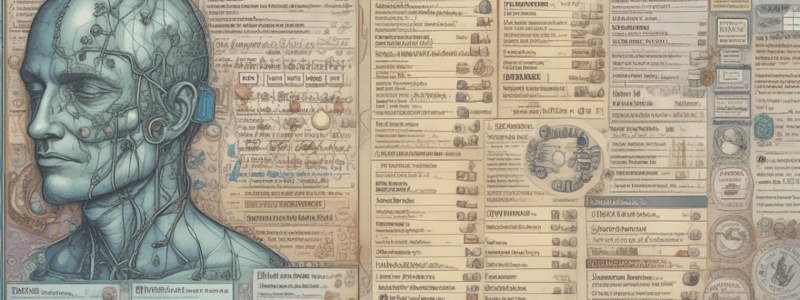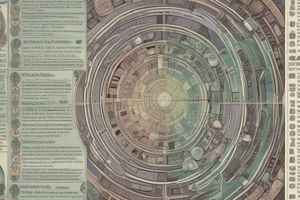Podcast
Questions and Answers
What is the brand name for the generic drug Acetaminophen with Codeine?
What is the brand name for the generic drug Acetaminophen with Codeine?
- Tylenol with Codeine (correct)
- Subutex
- Fiorinal
- Fioricet with Codeine
Which of the following is a brand name for Butorphanol?
Which of the following is a brand name for Butorphanol?
- Provigil
- Stadol (correct)
- Talwin NX
- Equanil
Which generic drug is associated with the brand name Sonata?
Which generic drug is associated with the brand name Sonata?
- Zolpidem
- Zaleplon (correct)
- Pregabalin
- Alprazolam
Which of the following is NOT a brand name for Buprenorphine?
Which of the following is NOT a brand name for Buprenorphine?
What is the primary use of Diphenoxylate/Atropine, sold under the brand name Lomotil?
What is the primary use of Diphenoxylate/Atropine, sold under the brand name Lomotil?
Which of the following is a brand name for the generic drug Carisoprodol?
Which of the following is a brand name for the generic drug Carisoprodol?
Which drug is referred to by the brand name Ambien?
Which drug is referred to by the brand name Ambien?
What is the brand name of the drug that is also known as Fibromyalgia treatment Pregabalin?
What is the brand name of the drug that is also known as Fibromyalgia treatment Pregabalin?
Which of the following drugs falls under Schedule I?
Which of the following drugs falls under Schedule I?
What potential for abuse do Schedule III drugs have compared to Schedule I and II drugs?
What potential for abuse do Schedule III drugs have compared to Schedule I and II drugs?
Which drug is NOT classified as Schedule II?
Which drug is NOT classified as Schedule II?
Which combination of substances is represented by a Schedule II drug?
Which combination of substances is represented by a Schedule II drug?
What defines the medical use status of Schedule I drugs?
What defines the medical use status of Schedule I drugs?
Which of the following is true about Hydrocodone products listed in Schedule II?
Which of the following is true about Hydrocodone products listed in Schedule II?
Which anabolic steroid is classified as Schedule III?
Which anabolic steroid is classified as Schedule III?
Which Schedule II drug is used primarily for pain relief?
Which Schedule II drug is used primarily for pain relief?
How are drugs placed in Schedule II characterized?
How are drugs placed in Schedule II characterized?
Which of the following statements regarding Schedule I drugs is accurate?
Which of the following statements regarding Schedule I drugs is accurate?
Which example correctly identifies a Schedule II drug?
Which example correctly identifies a Schedule II drug?
What distinguishes Schedule II drugs from Schedule III drugs?
What distinguishes Schedule II drugs from Schedule III drugs?
Which of the following anabolic steroids is categorized under Schedule III?
Which of the following anabolic steroids is categorized under Schedule III?
Which of the following substances is NOT an example of a Schedule II drug?
Which of the following substances is NOT an example of a Schedule II drug?
Which of the following correctly defines the characteristics of Schedule III drugs?
Which of the following correctly defines the characteristics of Schedule III drugs?
Which of the following combinations correctly identifies Hydrocodone products as Schedule II?
Which of the following combinations correctly identifies Hydrocodone products as Schedule II?
Which drug is paired with its corresponding brand name incorrectly?
Which drug is paired with its corresponding brand name incorrectly?
Which drug is categorized as a depressant under Schedule II?
Which drug is categorized as a depressant under Schedule II?
Which of the following is true about Hallucinogens listed in Schedule I?
Which of the following is true about Hallucinogens listed in Schedule I?
Which drug listed is primarily associated with the treatment of narcolepsy or sleep disorders?
Which drug listed is primarily associated with the treatment of narcolepsy or sleep disorders?
Which combination of drugs is represented by a Schedule IV classification?
Which combination of drugs is represented by a Schedule IV classification?
Which of the following drugs has been pulled off the market?
Which of the following drugs has been pulled off the market?
Which of these drugs is classified under Schedule V due to its low potential for abuse?
Which of these drugs is classified under Schedule V due to its low potential for abuse?
Which Schedule IV benzodiazepine is known for its rapid onset of action?
Which Schedule IV benzodiazepine is known for its rapid onset of action?
Which of the following drugs is a controlled substance in Schedule III due to its potential for abuse?
Which of the following drugs is a controlled substance in Schedule III due to its potential for abuse?
Which drug's brand name is associated with the treatment of insomnia and is a Benzo?
Which drug's brand name is associated with the treatment of insomnia and is a Benzo?
Which drug is classified under Schedule IV and is used primarily as a muscle relaxant?
Which drug is classified under Schedule IV and is used primarily as a muscle relaxant?
Study Notes
Schedule I
- Drugs with no accepted medical use and high abuse potential
- Average practitioners cannot prescribe Schedule I drugs
- Examples include heroin, LSD, marijuana (natural and synthetic), methylone, and methaqualone
Schedule II
- High abuse potential but accepted medical use in the U.S., often with restrictions
- Notable drugs include:
- Alfentanil (Alfenta)
- Amphetamine mixed (Adderall)
- Oxycodone (OxyContin), with combinations like Percocet and Vicodin
- Hydrocodone combinations, including Tussionex and Lortab
Schedule III
- Abuse potential less than Schedules I and II with accepted medical use
- Includes drugs such as:
- Buprenorphine (Subutex, Suboxone)
- Ketamine (Ketalar)
- Dronabinol (Marinol)
- Acetaminophen with Codeine (Tylenol with Codeine)
Schedule IV
- Low abuse potential relative to Schedules III and IV with accepted medical use
- Key drugs include:
- Alprazolam (Xanax)
- Diazepam (Valium)
- Zolpidem (Ambien)
- Tramadol (Ultram)
Schedule V
- Lowest abuse potential among the controlled substances, with accepted medical use
- Examples include:
- Codeine cough syrups (Robitussin AC)
- Diphenoxylate/Atropine (Lomotil)
- Pregabalin (Lyrica)
- Lacosamide (Vimpat)
Anabolic Steroids (Schedule II NYS and Schedule III Federal)
- Classified separately due to specific regulatory focus
- Examples include:
- Testosterone (various formulations including Androgel)
- Nandrolone Decanoate (Deca-Durabolin)
- Methandienone (Dianabol)
Additional Characteristics
- Schedules classify drugs based on their potential for abuse and medical acceptance
- Scheduling impacts prescription practices and regulatory oversight in the U.S.
- Awareness of brand names and combinations helps in identifying prescription drugs.
Schedule I
- Drugs with no accepted medical use and high abuse potential
- Average practitioners cannot prescribe Schedule I drugs
- Examples include heroin, LSD, marijuana (natural and synthetic), methylone, and methaqualone
Schedule II
- High abuse potential but accepted medical use in the U.S., often with restrictions
- Notable drugs include:
- Alfentanil (Alfenta)
- Amphetamine mixed (Adderall)
- Oxycodone (OxyContin), with combinations like Percocet and Vicodin
- Hydrocodone combinations, including Tussionex and Lortab
Schedule III
- Abuse potential less than Schedules I and II with accepted medical use
- Includes drugs such as:
- Buprenorphine (Subutex, Suboxone)
- Ketamine (Ketalar)
- Dronabinol (Marinol)
- Acetaminophen with Codeine (Tylenol with Codeine)
Schedule IV
- Low abuse potential relative to Schedules III and IV with accepted medical use
- Key drugs include:
- Alprazolam (Xanax)
- Diazepam (Valium)
- Zolpidem (Ambien)
- Tramadol (Ultram)
Schedule V
- Lowest abuse potential among the controlled substances, with accepted medical use
- Examples include:
- Codeine cough syrups (Robitussin AC)
- Diphenoxylate/Atropine (Lomotil)
- Pregabalin (Lyrica)
- Lacosamide (Vimpat)
Anabolic Steroids (Schedule II NYS and Schedule III Federal)
- Classified separately due to specific regulatory focus
- Examples include:
- Testosterone (various formulations including Androgel)
- Nandrolone Decanoate (Deca-Durabolin)
- Methandienone (Dianabol)
Additional Characteristics
- Schedules classify drugs based on their potential for abuse and medical acceptance
- Scheduling impacts prescription practices and regulatory oversight in the U.S.
- Awareness of brand names and combinations helps in identifying prescription drugs.
Studying That Suits You
Use AI to generate personalized quizzes and flashcards to suit your learning preferences.
Description
Test your knowledge on the classification of drugs under Schedule I and II. This quiz covers the characteristics, examples, and restrictions associated with these categories, focusing on both illicit and prescription medications. Ideal for those studying pharmacology or healthcare.




